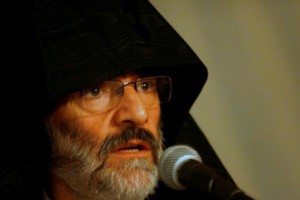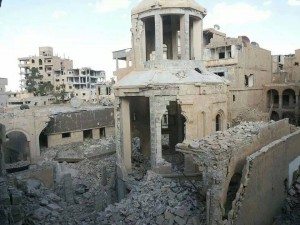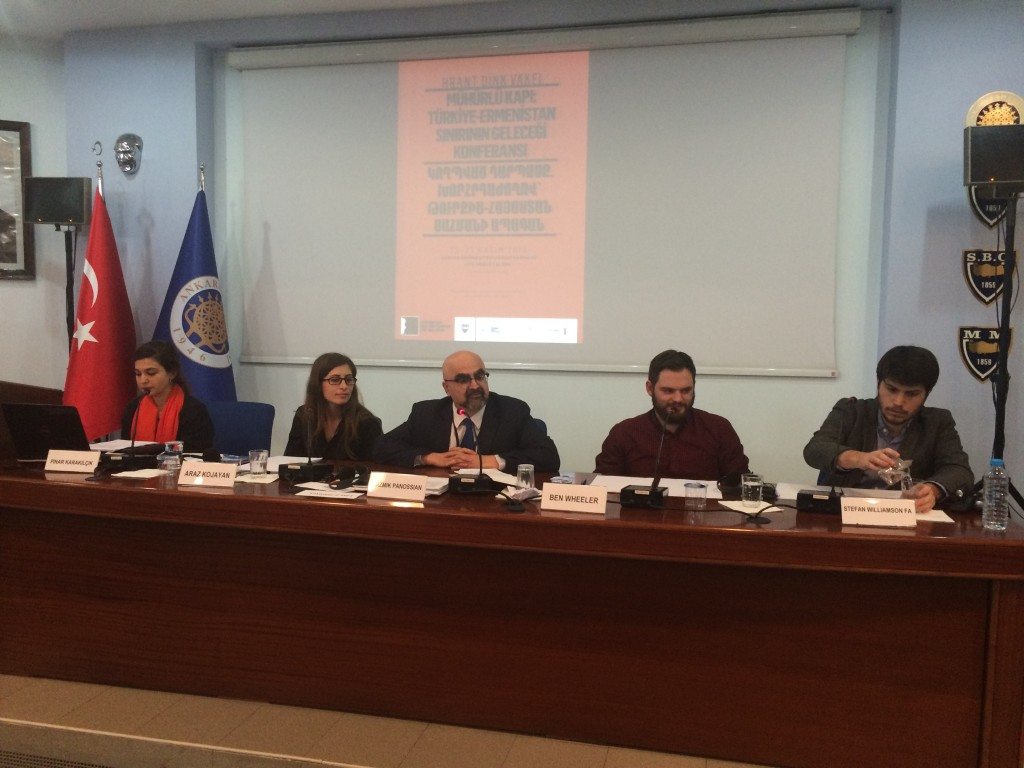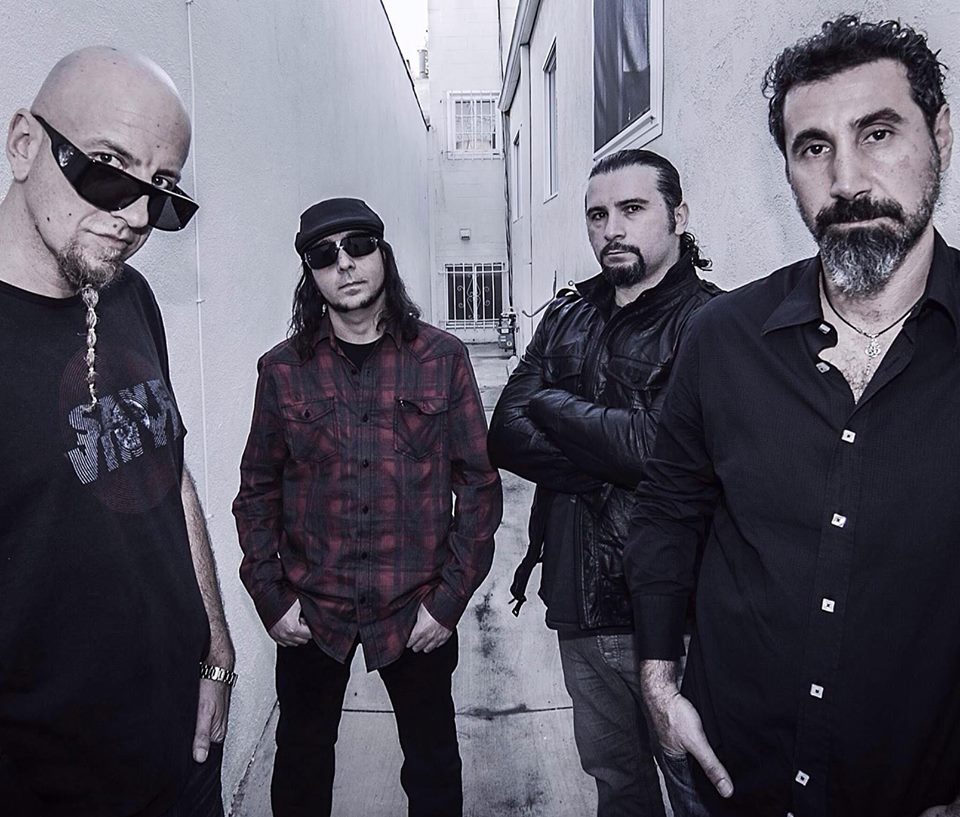Special for the Armenian Weekly
WATERTOWN (A.W.)—In late October, Archbishop Shahan Sarkisian, the
prelate of Aleppo, granted an interview to the Armenian Weekly. The
Archbishop was in Boston to meet with community organizations and to
personally thank the Armenian Relief Society (ARS) for its efforts in
providing assistance to the Syrian-Armenian community. During the
hour-long interview—conducted in Armenian—Archbishop Sarkisian gave an
overview of the Syrian crisis, and spoke about the challenges facing the
community today. He was direct in criticizing the worldwide Armenian
community for failing to respond to the crisis in a united and
comprehensive manner. He said that there is a difference between being
concerned and interested—and argued that what he was witnessing was
interest and not concern. To be concerned, he added, means to take on
responsibility, and that has been missing in the relief efforts.

Archbishop Shahan Sarkisian (Photo by Tom Vartabedian)
Archbishop Sarkisian emphasized the importance of keeping Armenian
schools in Syria open for students—a cause he considers vital to the
survival of the community. “Armenian schools are the light of our eyes,”
he said, and they need the support of the diaspora. He also spoke about
communal organization, relations with neighboring communities, and the
dangers before them.
The archbishop also talked about the media and its failures—calling
the leading media outlets “messengers of lies.” He criticized news
outlets for regurgitating unverified information, likening the
misinformation to cancer. For instance, he said, evidence is lacking in
the fate of the destruction of the Armenian Church and Genocide Memorial
in Der Zor, and he could not say with certainty who the culprits were.
He noted that the destruction of the church did not fit ISIS’s modus
operandi, since the group typically banks on publicizing their acts for
maximum shock effect and propaganda.
He held, however, that the role of Turkey is “great” in the Syrian
crisis, but that revealing evidence would only jeopardize the safety of
the community.
Archbishop Sarkisian spoke at length about the importance of
preserving the Syrian-Armenian community and the role it could play in
the larger Middle Eastern—and in today’s geopolitical—reality. The
Armenian community is a bridge, he said, between the West and the East,
as Armenians occupy a unique position as a trusted people by both the
West and the East. He spoke about the
dangers of being such a bridge, and about the community’s policy of maintaining positive neutrality.
The archbishop also criticized what he saw as the “naiveté” of the
diaspora when publicizing the various fundraising events and sums raised
for Syrian-Armenian relief efforts. He argued that such publicity has
in the past jeopardized the safety of the community, especially when
kidnappings-for-ransoms were rampant.
Although the archbishop gave a number of interviews while in North
America, he explained that he had turned down such opportunities
beforehand for fear of repercussions on the community. If my words are
taken out of context, he said, it is the community who will suffer the
consequences.
The archbishop arrived in the U.S. on Oct. 13, and proceeded to tour
Armenian communities in North America, including Canada. He returned to
Syria on Nov. 6.
Below is the interview in its entirety.
***
Nanore Barsoumian—Thank you for this opportunity. As
you may know, the Armenian Weekly has been following the Syrian crisis
closely. Armenians worldwide are concerned about the situation in Syria.
Please give us an overview of the crisis—not just in terms of the
Armenian community, but as it applies to the whole of Syria.
Archbishop Shahan Sarkisian—A distinction must be made between being
concerned and being
interested.
Most Armenians might be interested, but are most Armenians concerned
about Syrian Armenians? Not from my perspective. I don’t see it.
Judging from what I’m seeing, first, it is a disorganized way of
being concerned. Second, I see the concern as being more about financial
considerations and property. There is a community there and a hundred
years after the genocide it is settled and organized. But the Aleppo
Armenian community has a nearly 1,000-year history. After the genocide,
at the doorstep of the Centennial, Armenians are generally interested in
what is happening. That sort of interest does not only apply to
Armenians but to anyone on this planet who is interested in what is
going on in the Middle East and, specifically, Syria. For me, concern is
something else. To be
concerned means to be committed, to
assume responsibility. And assuming responsibility does not mean to send
financial assistance to Armenians in Aleppo and Syria. Not at all. That
is only one part of an entire program that does
not exist. This is the core issue.
To be concerned means to be committed, to assume
responsibility. And assuming responsibility does not mean to send
financial assistance to Armenians in Aleppo and Syria. Not at all. That
is only one part of an entire program that does not exist. This is the core issue.
But to answer your question, the Middle East has always been a stage
for wars and upheavals. Recently, there have been many color
revolutions, including the [Arab] Spring uprisings, one wave of which
took place in Syria, and then turned into armed clashes. The fighting
spread. The fire spread from one place to another, just as it would in a
forest with dry leaves.
Today, without exception, all the cities and villages in Syria are in
a state of war. There are some places that the war has devastated so
badly that there is no space left for fighting, and the situation has
therefore calmed down—not because of peace deals. There are other places
that are still in the process of being ruined and the devastation
continues. I am neither an expert in international and local diplomacy,
nor in political science. I am not an expert in the military field. But I
do know that although Syria is one entity on the map, the country is
fragmented into numerous parts.
The Syrian-Armenian community in the Middle East has been in constant
communication and continues to have relations with various Armenian,
Christian, and local peoples, nations, religions, and cultures. It
cannot remain indifferent or passive. In general, from the beginning of
these events, our position—a costly and difficult position—was to adopt a
positive stance: We would not participate in any military activities.
We would not side with anyone. Some people call that positive
neutrality, which is a political concept. Ours is a variation of this
positive neutrality. People ask, ‘Which side are you on—this or that
side?’ We tell them, ‘We are on the third side.’ In terms of an
alternative, we represent a third side. But because we are few in
numbers, and our voices are hard to hear, we are forced—just like every
community, Christian and Muslim, and every ethnic group that makes up
the whole of Syria—to deal with the situation that has been created in
the country. We are interested in our surroundings, and we help those
around us, but we give priority to our community.
Unfortunately, Syria is presently facing uncertainty. There is no
sign of peace on the horizon. The war continues and, like everyone else,
we too must suffer the fire, the casualties, the kidnappings, the
destruction, and the various other types of harm.
The main problem is mis-information—inaccurate information…. the media is supposed to be the messenger of truth, but instead is a messenger of lies.
N.B.—Now there is a new reality, Da’esh (ISIS). How
does their treatment of minorities, such as the Yazidis and Armenians,
differ from others involved in the conflict? Do you see it as a
coincidence that the very same day Armenia celebrated the anniversary of
its independence, Da’esh reportedly destroyed the Armenian Church of
Der Zor? The destruction also came two days after Catholicos Aram I
announced he would sue Turkey over the return of the Sis Catholicosate
properties.
S.S.—First, let me be a bit critical, because in
today’s world, information can be artificial. The world’s PR
machine—whose main outlets are television, social media sites like
Facebook, Twitter, YouTube, and others, and on a lesser plane the print
media—often tries to get its information from safe sources. The big
journalistic machine disseminates news, and others repeat that
information, sometimes by paraphrasing it, or making some changes. So
the main problem is
mis-information—inaccurate information.
This resembles someone who has cancer and can’t get rid of it. This
is a cancer. This is not my job. I have had nothing to do with the media
specifically for this reason—and it is a key reason because the media
is supposed to be the messenger of truth, but instead is a messenger of
lies. Sometimes it outputs information without even fact checking, or
creates an atmosphere of shock. It’s an accepted reality. You don’t see
television programs about serious topics, nor do you see it online.
Something has to be bizarre for people to become interested; for
example, when they show a beheading, people find that interesting
because it awakens in them an animalistic instinct, and that interests
them. There is no other reason.
N.B.—You mean it shocks people. It’s shocking news.
S.S.—Yes, and they find it interesting. I’m going back to what I was noting earlier about being
interested.
Only a part of the information that comes from the media is true, but
is not verified. For example, who destroyed the Der Zor Holy Martyrs
Memorial and Church, and why? There is no verified evidence about it.
It’s the analysis that makes you think that on this date this happened,
or that on this date this was said, and so that means that these groups
were responsible for it. This is one side of it.

The first photos of the destruction of the Armenian Genocide Memorial Church in Der Zor emerged on Sept. 24.
For us Syrian Armenians, it is clear that in the Syrian crisis the
role of Turkey is great. And if we think that they are not interested in
us…they are interested in us more than anyone else. There is no lack of
evidence. But at the same time, you cannot reveal the evidence, because
revealing it means jeopardizing the safety of a community. So in the
case of Der Zor, when you say this group is responsible for the
destruction, I say I don’t know that. The images that emerged from Der
Zor—if the perpetrators belonged to a group that prepares images in
order to shock the world, it would have been very easy for them to
disseminate footage of the destruction [of the church] on YouTube. They
didn’t disseminate anything. There is one photograph, maximum two.
N.B.—But we know that the church has been destroyed.
S.S.—The photograph makes it clear—but who did it,
and why? The answer has been subject to the analysis of journalists and
politicians. But for us to come out and say these are the people
responsible… We know the groups we’ve had conflicts with, and they know
us. But those that we have not had issues with, why should I name them
[as culprits]? That would only turn their attention to us. Because of
that, this group that has invaded large parts of two countries has had
no direct conflict, relation, or communication with us. Absolutely none.
In the beginning of the events in Syria, especially the events in
Aleppo, we had numerous members of our community kidnapped. More than
100 of them. That was a phase when kidnappings were frequent. Ransoms
were paid, and finally that phase faded. The practice faded.
We were able to keep a balance until today. Two principles were
essential in keeping that balance: One of them was [respecting] the
country’s territorial integrity—that we are Syrians, and we use the term
“the Syrian Homeland,” not the term “Our Homeland.” We say, “Syrian
Homeland.” If a citizen of the United States of America says that this
is an alien homeland [օտար հայրենիք], it means that they have no right
to live there. This is especially true in the case of Syria, and in our
case. We have been living in Syria for a millennium. There are few
communities in Aleppo that are as old as us—you can count them on your
fingers. Just to remind you, the Armenian Forty Martyrs Cathedral [Սրբոց
Քառասուն Մանկանց Մայր Եկեղեցին] has a history of at least 500-600
years—and that’s just after its renovation. A few hundred years before
the renovation, it must have been a little chapel that Armenian pilgrims
used on their way to Jerusalem.
Our history in Syria did not begin with the genocide. Wherever
Armenians have gone, they have brought good with them. We have
contributed to the societies we live in—and that’s because we have felt
at home wherever we’ve gone. We haven’t felt like outsiders. That’s why
the country and the people are above all else. We neither side with
groups nor with different authorities.
Sitting here in the Hairenik offices, I remember [Simon] Vratsian.
One of his most famous sayings was: The fatherland is permanent; regimes
are not [Հայրենիքը մնայուն է, վարչակարգերը գնայուն են]. That’s why, in
Syria, we don’t have issues with anyone.
How are issues created? There are two factors: One is—and this is clear—Turkish involvement.
The second is the naiveté of our nation’s children. Let me give you
an example—an example that really pained us at the time. We are grateful
to all of our compatriots who have sent us assistance. But is there a
need to publicize in every newspaper, on Facebook, and everywhere that
we had a fundraising, and raised this much, and sent this much? It’s a
common sense issue. It is only lawful and right for someone to receive a
receipt, a report, an explanation as to whether the sum they donated
arrived where it was intended. But you don’t need to [publicize it]—and
it goes against Christianity. When your right hand gives, your left hand
does not need to know. And if your left hand gives, your right hand
does not need to know.
When the
kidnappings
began—just so you know—people called us and said, ‘You need to pay us
in order for us to release these people.’ Why? Because you have been
receiving millions from America. This is not a made-up story. I am a
prelate, I am responsible, and I know what I am telling you. This weighs
heavy. Those who left the country, that’s their business. But those who
are still live there don’t need added hardships on top of what they
have already had to endure. It causes pain. And that’s why I will go
back to what I first told you: I have not seen a united Armenian effort
for Syria and the Syrian Armenians—a pan-Armenian effort. My respects to
all the different circles, whatever they may be called—church, state,
party, all of them. The Syrian-Armenian crisis is not a local issue. It
is one of the biggest crises of the diaspora.













